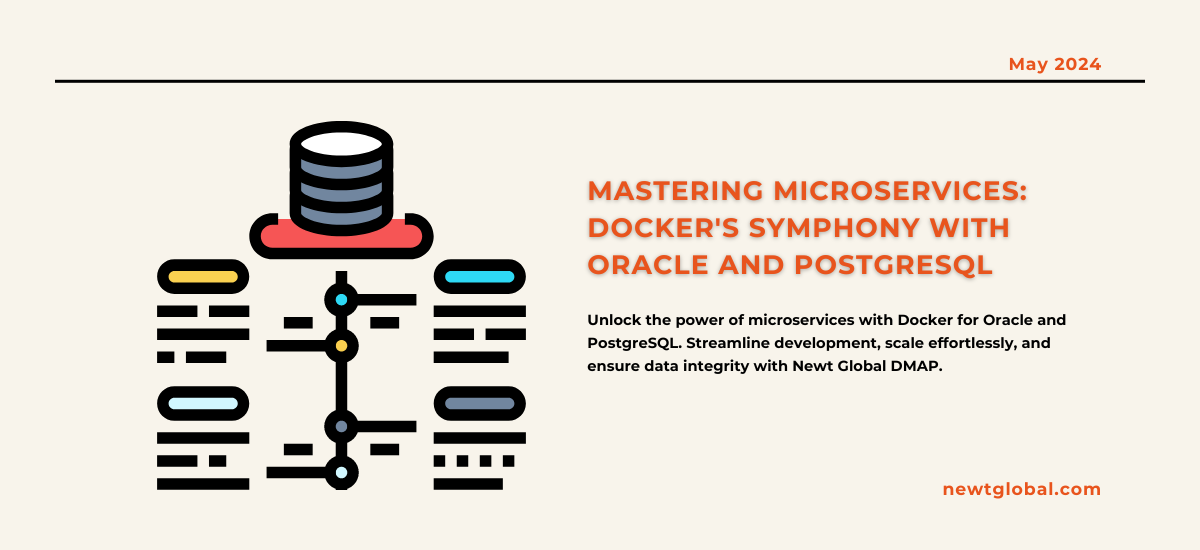
Software development keeps changing, and these days everyone’s talking about microservices. Microservices let development teams break up a big app into smaller parts that work together smoothly. This blog will take you through how to use microservices with Oracle and PostgreSQL databases using a tool called Docker to build apps that can grow easily.
Understanding Microservices:
Microservices split an app into smaller parts that can be worked on separately. This is different from the old way, where everything was stuck together in one big piece. Each small part, or service, handles a specific job, like logging in users, managing a product catalog, or processing orders. These services talk to each other through APIs, making it easier to handle changes, grow the app, and fix problems than in the old way.
Why Docker?
Docker is a tool that helps developers run their software the same way, no matter where it is – on a developer’s computer or in a live app. Docker is great for microservices because it makes it fast to start new parts of an app, saves resources, keeps parts of the app separate from each other, and helps them handle more work or users easily.
Using Docker with Databases:
In the world of microservices, databases are like the conductors keeping track of all the data. Traditionally, using many databases with microservices is hard, like managing a noisy group. Docker, along with tools like Docker Compose or Kubernetes, makes managing databases in a microservices setup easier, like a skilled conductor leading an orchestra.
Oracle and PostgreSQL: Key Players in Databases:
Oracle and PostgreSQL are two big names in databases, each with its own strong features. Using Docker to manage these databases makes setting up and running your microservices app smoother.
How to Do It:
-
- Create Dockerfiles: Write Dockerfiles for Oracle and PostgreSQL that set up the databases, including the right settings and tools they need.
- Use Docker Compose: With Docker Compose, you define how the parts of your app work together, including the Oracle and PostgreSQL databases. You’ll set up things like how the containers talk to each other and their settings in a Docker Compose file.
- Start Database Containers: Use Docker Compose to start up your databases with the right settings and configurations.
- Connect Services and Databases: Make sure your microservices can talk to the databases smoothly, using Docker’s network features or Kubernetes.
- Keep an Eye on Things and Adjust as Needed: Use monitoring tools to watch how your databases are doing and use Docker or Kubernetes to give them more resources when they need to handle more work.
Benefits of This Approach:
-
- Scalability: You can easily adjust your databases to handle more or less work.
- Isolation: Each database and service can be kept separate, making your app more secure and reliable.
- Consistency: Your databases will work the same way in development and production, avoiding surprises when you go live.
- Flexibility: You can switch between different databases or versions easily, without messing up the rest of your services.
Conclusion
Using microservices with Docker makes building software easier and more reliable. Docker helps manage databases smoothly, letting developers focus on creating great software that performs well. By embracing microservices and Docker, companies can improve their software development practices and deliver better results.
Unlock the Symphony of Microservices with Newt Global DMAP!
Ready to compose scalable and resilient applications with Oracle and PostgreSQL databases in a microservices architecture? Newt Global DMAP is your conductor for orchestrating Docker’s symphony of benefits.
Contact us at marketing@newtglobalcorp.com or visit newtglobal.com to explore how Newt Global DMAP can empower your organization to unlock the full potential of microservices architecture. Don’t miss this opportunity to harmonize rapid deployment, resource efficiency, and scalability while ensuring data integrity and availability.
Newt Global DMAP is your virtuoso solution designed to streamline database orchestration with Docker, providing a seamless journey from development to production.
Let’s elevate your software development practices with the harmony of microservices and Docker. Join us in shaping the future of agile application development with Newt Global DMAP.
